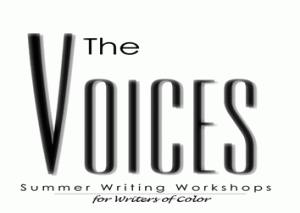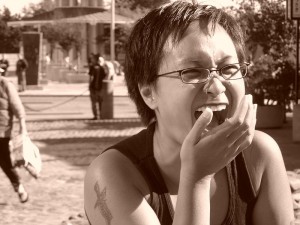This post is a little belated because I’ve been busy traveling, but here are some reflections on my experience last month at the Voices of Our Nations (VONA) Workshop 2010, hosted at the University of San Francisco.
The program website pretty much says it all: “The VONA Voices Workshop is dedicated to nurturing developing writers of color [who] come from around the globe to work with renowned writers of color.” Essentially, VONA is where you go to work with people like Junot Diaz, Chris Abani, and Suheir Hammad. Where you discover for yourself that there’s a rich and vibrant tradition of writers of color in the United States and that you can situate yourself in that incredible wealth of a heritage. It’s where you go to learn that you’re not the only one asking the question, “Where am I from, where are my people from, and why does that matter to my writing?”
Basically, VONA is the place where you walk into a workshop, sit down and your instructor says, “So what are your ancestors telling you today?” You sit awestruck as your classmates go around the room channeling these incredibly powerful, angry voices from our nation(s)’ untold histories, and what you end up with once everyone has spoken is a room of not just eleven poets, but generations of voices echoed through the sensibilities of your peers.
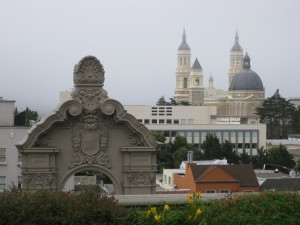
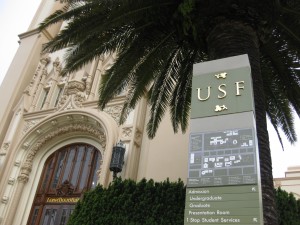
I attended VONA’s second session, which meant that I was in LA-based poet Ruth Forman’s poetry workshop, along with ten other women from around the country. Represented in our class was a wide diversity of cultural, and ethnic, and professional backgrounds — including a med student, an African Diaspora Studies Ph.D candidate, an art therapist, and a non-profit consultant… only to mention a few! Ruth fostered a warm culture of dialogue and collaboration, while advocating fiercely that we stick to June Jordan’s (one of her mentors) Poetry for the People guidelines for discussing poetry.
I learned so much from Ruth, particularly in our one-on-one conference where she shared with me her understanding of what it means to be an African American poet, following in a tradition that — as she sees it — has sought always to speak against injustice, bring hope to the community, and capture the musicality of spoken (and sung) language. To hear some of Ruth’s work, watch this clip of the VONA faculty reading, where she read several poems from her most recent collection, Prayers Like Shoes (Whit Press, 2009). You can also hear her on NPR, talking about her children’s book Young Cornrows Callin out the Moon (Children’s Book Press, 2007).
Each of VONA’s two sessions featured a mid-week faculty reading. Ours was sensational – we heard from Diem Jones with musician Len Wood, Tananarive Due, Ruth Forman, M. Evelina Galang, Chris Abani, Andrew X. Pham, Willie Perdomo, and Elmaz Abinader, each of whom are incredibly accomplished artists and writers. The auditorium was packed, and because so many in the audience were VONA participants, cries of “Hey, that’s my teacher!” echoed continually throughout the hall. For many of us, this was the first time we’d heard our instructors read — and the effect was magical. There they were, our workshop leaders — enacting, performing, embodying all they had been talking about in class.
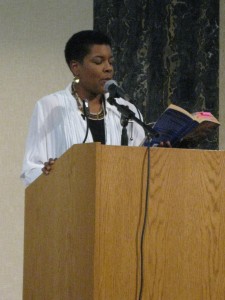
On the final evening of the workshop, every VONA participant (about 80 poets and writers in all) shared 300 words of their writing. Some of it was newly written, read right off of people’s laptops – or Blackberrys. Some of it was freshly revised after workshop that afternoon. All of it was raw, real, and bore witness to the tremendous weight of cultural Story represented in the room. Cave Canem fellow Tara Betts finished the evening off with a powerful, lyrical response to Wallace Stevens’ infamous comment, “Who let the coon in?” when Gwendolyn Brooks arrived at the 1950 Drew-Phalen Awards banquet.
The title of Betts’ poem? “Thirteen Ways of Looking at a Black Woman.” Rock on, Tara.
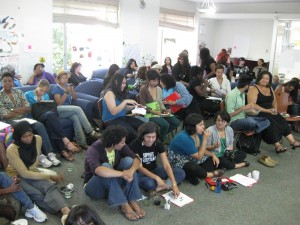
To Consider…
For a complete list of VONA 2010 faculty, click here. Read these writers’ books, follow their blogs and, if you can, by all means study with them – or at least hear them read.
Apply to next year’s Voices Workshop! The application probably won’t be open for another few months, but check the website periodically if this is something you think you may enjoy participating in.
Lastly, the workshop offers limited scholarships to seminar participants, which is made possible only through the generosity of its donors. If you’d like to help support this initiative, consider donating through the program website.
